Click to read more . . .
Save the Headlands Conference
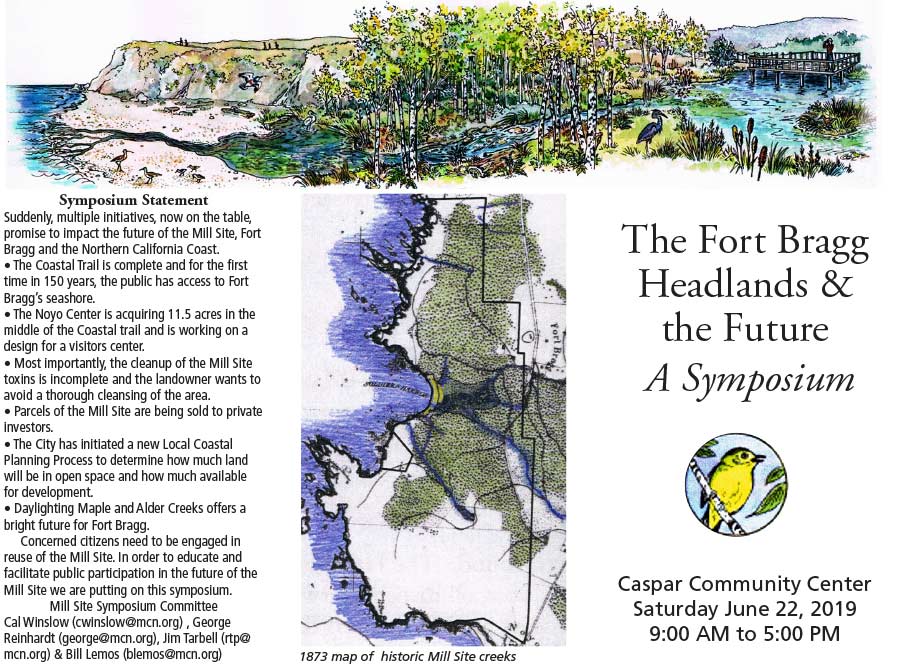
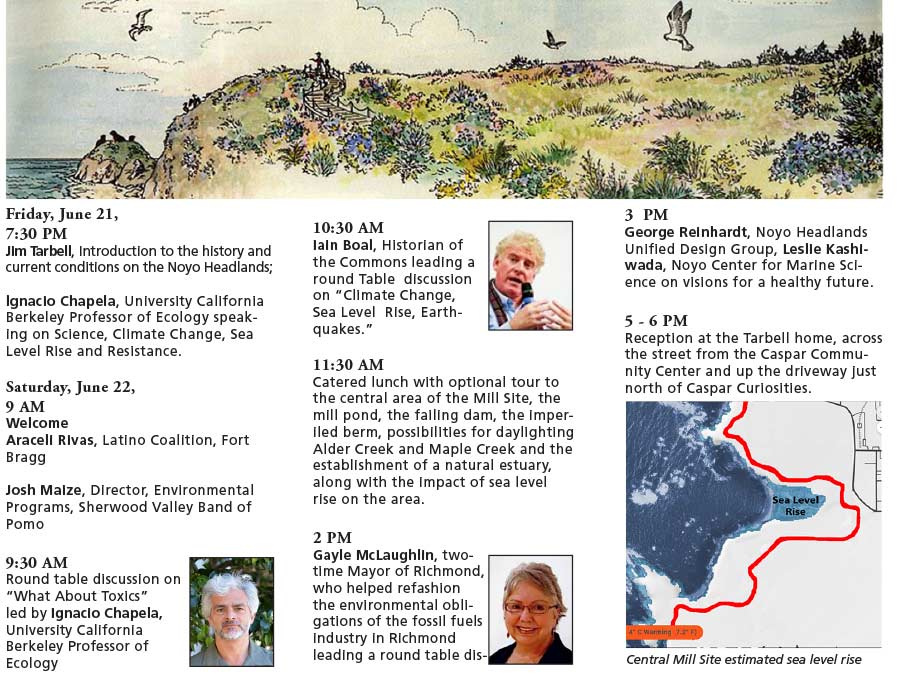
The Mendocino Coast – An Eco-communitarian Project
February 18, 19, 20, 2011: Caspar Community Center, Caspar: CA and Jug Handle Farm Nature Center, Caspar, CA
When the West fully learns that cooperation, not rugged
individualism, is the quality that most characterizes and preserves it,
then it will have achieved itself and outlived its origins. Then it has a
chance to create a society to match its scenery.
—Wallace Stegner
A Conference Presented by
The Mendocino Institute
In conjunction with the Commons Group, Retort and PM Press
With support from the Christensen Fund
*
February 18, 19, 20, 2011: Caspar Community Center, Caspar: CA
and Jug Handle Farm Nature Center, Caspar, CA
The Mendocino Coast – An Eco-communitarian Project
The Mendocino Coast is known for the breathtaking beauty of its coastline, its steep canyons, and redwood forests, as well as for the diversity and independence of its communities.
This coastal eco-region of Mendocino County, in addition to its physical magnificence, is also home to a rich history of creativity and experimentation, of environmentalism and deep concern for the fate of the planet. It is loved by residents and visitors alike.
Today, Mendocino County is in transition. Its future is unclear. Both its beauty and way of life are threatened. Traditional industries, chiefly timber and fisheries, have all but come to a halt – and not just as the result of recession and the housing crisis. The forests are scarred and exhausted. The watersheds are fouled; the once rich seas are virtually empty of salmon. Coastal waters have experienced a rapid increase in the loss of marine biodiversity and habitat degradation. Species and habitat loss is a reality.
A new economy has yet to emerge – high expectations for a high tech revolution have not been realized. The remains of the giant Georgia Pacific mill are ghostly reminders of the past – they suggest that manufacturing is not in Fort Bragg’s future, light or otherwise. The California crisis in education dims any prospect of a new university – long the dream of many. Now even the stream of well-to-do retirees has been reduced to a trickle, undermining with it what remains of the construction trade and the local service economy.
This situation, alas, is not so unusual in California. As elsewhere, war, recession and California’s financial crisis bring high unemployment, increasing poverty – also education in decline, social services in a state of collapse. Income gaps widen, increasingly the population is comprised of well-to-do retirees and business owners on the one side, marginal whites and poorly paid service workers, native peoples, and, increasingly, Latinos, on the other. These workers, in the absence of affordable housing, crowd into substandard housing in Fort Bragg, doubling up in trailers and apartments, commuting as far as Pt. Arena for employment. The clear prospect of a two-tier society emerges, one prosperous, the other poor, the gap widens, destructive divisions are exacerbated. This undermines any meaningful prospect of community.
Residents continue to extol the virtues of this coastal “paradise” – often quite rightly – and there is great pride in community but an accurate appraisal is more complex. The fact is that these conditions bring new problems – already a kind of unspoken despair undermines the confidence of the people and opens the door to activity historically widely opposed.
Thus, climate change, the world energy crisis, combine with local unemployment, to bring new proposals for off-shore drilling, industrial bio-mass projects in our forests and plans for massive corporate coastal wave-energy projects. They bring appeals, not for increased conservation but for the loosening of restrictions on logging and fishing. The tourist industry languishes; it too seeks relief, while always overcrowded parks sit unattended, many threatened with closure. Nevertheless, developers await; one group has already designed what essentially would transform Fort Bragg’s magnificent headlands into a mall with a view.
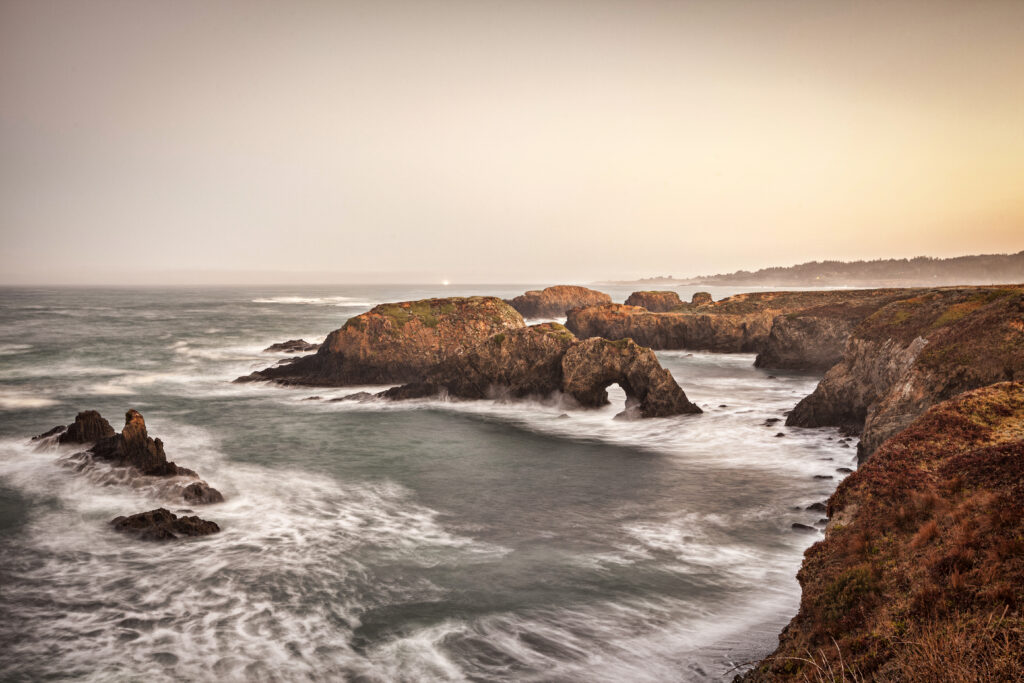
Purpose and Goals
This is a proposal for a study of the coastal region of Mendocino County, one that will lead to a coastal plan, that is an alternative plan for the Mendocino Coast, a plan deliberately educational at this time, but framed with the intention of creating practical new visions for the County.
This is a crucial time for a new vision. The recession and environmental crisis have opened space normally occupied by the developers and the state’s managers. This hiatus offers the time – a pause, space for reflection and creative, alternative ways of thinking about conservation, sustainable living and the climate, but a pause that will not, of course, last for long.
Most importantly, it allows for a discussion of what we, the residents of the Coast would like – and what we ourselves are capable of doing. What can a community do? There already exists, for example, a vibrant discussion of “the local” – local sustainability, food, energy, etc. But what of, “the global?” And can we, at the same time, inspire a discussion of integration, living wages, healthy, affordable housing? And what about the environmental crisis and the global climate crisis that are immediate threats to us all, as is social decay. The challenges are inescapable – how can a community respond and make a positive contribution?
A problem is that this discussion rarely gets beyond individual initiatives – so the question remains, what can a community do, what can we do together? We have a long tradition of community effort, the co-operatives of the Finnish immigrants, rusticators of many varieties – back-to-the-landers, communards, artists and dreamers and newcomers seeking more quality in life. The Woodlands and Cotton Auditorium (legacies of the New Deal) are powerful reminders of working together for the common good – but also local expressions of a larger national project.
This is a proposal to begin this project with a conference, one that will bring authorities on such issues as marine protection, reforestation, affordable housing, eco-tourism and recreation to Mendocino to join local authorities and activists to chart new directions and formulate new visions. The conference will be the first step in the project – it will be organized to facilitate thoughtful discussion among a diverse group of local planners, environmentalists and activists plus invited “experts” from the region. It will produce recommendations concerning what is and what is not possible, how to go forward, plus immediate next steps.

The Conference
February 18, 19, 20, 2011: Caspar Community Center, Caspar: CA and Jug Handle Farm Nature Center, Caspar, CA
The conference will consider the coastal region and its communities in three broad areas:
1. Community – how to go beyond clichés about community and begin to move toward the realities of community, of a living, integrated commons, with expanded, shared work and living, particular in housing, education, health and social welfare. How to create here in rural coastal California, what Wallace Stegner has suggested, “a society to match its scenery…”
2: Conservation – if and how to preserve the forests and coastal waters. Can our forests, revived, be part of a more sustainable, nature-friendly economy? Can they play a part in the reforestation of the once great temperate forests of the Pacific Coast, of the planet – both for our own sake and the health of the planet and its atmosphere? How to respond to modest conservation measures such as the Marine Life Protection Act (MLPA) and local opposition to it? How to respond to degradation of watersheds and the poisoning of streams and rivers?
3. Sustainability – how to create and expand a local economy (within a regional and global economy) that can sustain the environment of the region, in an era of concern for energy resources, independent food sources and meaningful work, while at the same time allowing for, building on recreational opportunities for a very crowded state. Sustainability that is based on high standards of quality of life – including living wages, an integrated population, one that offers affordable housing, quality education and healthcare, plus the positive qualities we find in the rural, coastal region.
The conference format will be round-table; twenty-five to thirty-five invited participants representing a wide range of experience and expertise in the areas to be considered. This format is intended to ensure ample time for thorough discussion, back and forth, debate plus informed participation.
Public Sessions
Iain Boal (author of The Long Theft, forthcoming), Ignacio Chapela (Professor of Biology, UC Berkeley), Gray Brechin of the New Deal Project and Raj Patel (author, Stuffed and Starved and The Value of Nothing) will contribute public lectures, open to the broader communities.
Pre-conference Meeting
Proposed gathering of coastal residents with experience in communal, and cooperative and collectives activities: the purpose of this will be to help focus discussion on what has worked, what might have lessons for the future.
We intend to have a concluding session – for evaluation. We also intend to produce transcriptions and summaries of the sessions, plus to collect written papers and presentations. These will be circulated for comment to all participants following the conference.
PM Press in Oakland has agreed to do the transcriptions and recordings. It also has agreed in principle to reproducing sections of these in a pamphlet/booklet.
Finally we propose to establish a working group for follow-up – a local group organized to develop specific targets, goals and campaigns for continuing the coastal planning project, including seeking further funding and staffing.
Challenges
The great challenge will be to turn this discussion to action. There is no guarantee that this can be done; nevertheless, it can be said that this project is an indication of an obvious need and the goal of bringing together disparate efforts – oceans, forests, housing, integration, education, health, etc. – is widely supported.
The short-term challenges are to get local participants, first to commit to two days of meetings and second to come prepared. This will take some work but past experience here shows it can be done. Another challenge is to consider the issue of the marijuana economy – in context – without turning the meeting into (yet another) marijuana conference. The same can be said for the issue of marine life protection, now the subject of intense local debate – nevertheless a subject of the greatest importance. These will take precautionary efforts – mainly in terms of seeing that fair discussion of these topics is allowed but does not dominate.
Submitted by Cal Winslow,
Director, Mendocino Institute, October 2010
Addendum:
The Mendocino Institute was founded in the year 2000 with the purpose of providing research, educational activities and forums on the Mendocino Coast. It has a Director and Three trustees one of whom is the Director. These are all volunteer positions.
Trustees
Cal Winslow, Director
Cal Winslow is a social historian, educated at Antioch College
and Warwick University in the UK where he wrote his Ph.D. dissertation
under the direction of the late Edward Thompson. Prior to coming to
Northern California, he worked at the City College, City University of
New York. He has also taught at the Northern College for Residential
Adult Education in Yorkshire, at York University in the UK and the
Evergreen College in Olympia, Washington. He is currently a Fellow in
Environmental Politics at the University of California, Berkeley. He is
co-author with the late Edward Thompson of Albion’s Fatal Tree (Penguin and Pantheon), a study of crime and society in Eighteenth Century England and editor of Waterfront Workers: New Perspectives on Race and Class (Illinois). He is author of Labor’s Civil Wars in California (PM 2010) and co-editor with Robert Brenner of Rebel Rank and File: Labor Militancy and Revolt during the Long Seventies,
(Verso Press, 2010). He is collaborating with Michael Watts, Iain Boal
and Janferie Stone on a study of communalism in Northern California in
the 60s and 70s (West of Eden, forthcoming, PM Press 2011). He
is also working on a social and environmental history of the Redwood
Forest. He is a founder of the Mendocino Institute. He lives with his
family near Caspar on the Mendocino Coast.
Iain Boal, Trustee
Iain Boal is an Irish social historian of science and technics, educated at Oxford, Cambridge and London Universities. He moved to Boston in the early 80s where he was a member of the Pumping Station Collective. He has taught at Harvard, Stanford and the University of California at Santa Cruz and Berkeley, where he is affiliated with the Geography Department. He is associated with the Retort group, and is one of the co-authors of Retort’s Afflicted Power: Capital and Spectacle in a New Age of War (Verso).
He co-edited with James Brook, Resisting the Virtual Life: The Culture and Politics of Information (City Lights), and with Michael Watts, Cal Winslow and Janferie Stone is editing West of Eden, an anthology on the flowering of communalism in California during the 60s and 70s. In 2005/6 he held a Guggenheim Fellowship in science and technology to research “the bicycle in world culture”. His book on the history of the commons – The Long Theft: Episodes in the History of Enclosure – is forthcoming from Faber and Faber. He lives in Berkeley.
Will Russell, Trustee
Will Russell is a forest ecologist and activist, educated at the University of California, Berkeley. He is currently an Assistant Professor of Environmental Studies at San Jose State University where he teaches courses on forest restoration and management and coordinates the graduate program. In addition he has also taught at the New College of California and the San Francisco State University field campus; he has worked as a research associate for the U.S. Forest Service, the USGS Biological Resources Division, and California State Parks. He is currently involved in research projects related to the conservation and restoration of redwood forest communities including studies on natural regeneration, fire behavior, and the value of ecotourism.
Will Russell has deep roots in the Mendocino Coast region. A long-term resident of the area, he learned about forest ecology and preservation from his Grandfather Lewis Henry Russell (nature poet and forest activist) and his grandmother “Skilly” Russell (amateur botanist and wildcrafter) on their 120-acre mixed old-growth property near the town of Mendocino. The Russell land, now part of the State Park system, serves as a classroom and laboratory for Will and his students in his role as a Professor of Environmental Studies as San Jose State University. His research on the recovery of redwood forests following logging has direct applications to the restoration and management of Mendocino Coast ecosystems.
Will has published numerous research papers in scientific journals and conference proceedings including the “The Influence of Timber Harvest on the Structure and Composition of Riparian Forests in the Coastal Redwood Region” in Forest Ecology and Management; “The Effects of Timber Harvesting on the Structure and Composition of Adjacent Old-Growth Coast Redwood Forest” in Landscape Ecology; and “Edge Effects and the Effective Size of Old-Growth Coast Redwood Preserves” in the Proceedings of the Wilderness Science in a Time of Change Conference.
The Institute is governed by its Trustees. They meet twice annually.
Mendocino Institute Projects
In 2000-2001, the Institute helped launch the Campaign to Restore Jackson State, the 55,000 acre state forest in Mendocino County. This involved developing the Campaign as an organization, organizing its founding conference, and producing the booklet, “Proceedings of the Conference on the Restoration and Management of Coast Redwood Forests,” Cal Winslow, ed. (Fort Bragg, 2001). The Campaign continues to advocate for the restriction of logging in the park and to enhance recreational opportunity. Funding by the Dharma Cloud Foundation.
In 2002, the Institute conducted a need assessment on the topic of affordable housing. The findings were the topic of the February 23, 2002, conference at the College of the Redwoods on the North Coast of Mendocino County. The conference was cosponsored by the Mendocino County Community Development Commission. Funding by The Mendocino Coast Community Coordinating Council (MC4).
In 2004, the Institute initiated “Community and Democracy: Mendocino, The Communal Experience (1965-1985),” a project in partnership with the Institute for International Studies, University of California, Berkeley. This consisted of a workshop and a conference in Caspar as well as two conferences in Berkeley. One outcome is the volume, edited by Iain Boal, Janferie Stone, Michael Watts and Cal Winslow, West of Eden, Communes and Utopia in Northern California (PM Press, forthcoming 2011). Funding by the Ford Foundation and the Institute for International Relations, UC Berkeley.
Institute Trustee William Russell led the following projects beginning in 2006, working in partnership with the Department of Environmental Studies, San Jose State University, the Save the Redwoods League and the Department of Parks, San Francisco. “Ecological Monitoring of Remnant Coastal Plant Communities in San Francisco, California” (with the San Francisco Department of Parks and Recreation). “Natural Regeneration Following Timber-Harvest in Coast Redwood Forests in Big River State Park (with the Save the Redwoods League).
In 2008, the Institute cosponsored the statewide conference “The Crisis of the California Commons,” held in Berkeley, April 27-29, with the California Studies Association and Heyday Books. Mendocino Institute Trustees Boal and Winslow served on the planning committee, Winslow and Russell led sessions on forest devastation and restoration, Boal on the communal experience in Northern California. Funding by the California Studies Association.
“NB. West of Eden: Communes and Utopia in Northern California is forthcoming from PM Press in 2011. Winslow is continuing his history, The Redwood Region, A Forest and Its People (as well as work within the healthcare movement, having published Labor’s Civil Wars in California (PM Press: Oakland, 2010) and edited Rebel Rank and File (Verso, 2010); Guggenheim Fellow Iain Boal, author of Resisting the Virtual Life (City Lights Books) is completing The Green Machine, a history of the bicycle(Notting Hill Editions, 2011); and William Russell routinely brings graduate students to Mendocino’s Redwood forests on research projects. He is now a candidate for tenure at San Jose State University.”
Mendocino Coast Eco-Communitarian Conference Report
[Will Parrish’s penetrating investigations into Northern California’s grape plantations can be found in the Anderson Valley Advertiser (<theava.com>) whose masthead slogans are “All happy. None Rich. None Poor.” and “Peace to the Cottages! War on the Palaces!”. IB]
Sovereignty, not Localization
Will Parrish
24 ii 2011
The most exciting aspect of Mendocino County’s civic life is the popularity of efforts geared toward creating a more ecologically sane, human scale economic system. These activities commonly fall under the rubric of ‚”economic localization‚”. The basic idea is that people living in a given geographic area should produce what they use for themselves, rather than depend on purely self-interested corporations and wealthy absentee land owners to furnish these things for them.
In recent years, Mendocino County’s far-flung assortment of activities that are consciously geared toward achieving this end has been growing in breadth and depth. The majority of efforts by localization activists encompass the areas of food cultivation and distribution (e.g., locally owned organic farms and farmers’ markets), transportation (e.g., Cars Are Evil), energy production (e.g., solar panel installations at private residences), and education about the tenuous state of the global economy.
One strong measure of California North Coast’s emergence as a national localization hub is the regional prevalence of sharing organic, open-pollinated heirloom seeds and seed saving. Heirloom seeds are those handed down by families and tribes over generations.
Earlier this month, I participated in annual seed exchanges in both Boonville and Laytonville, which gatherings featured a broad assortment of seeds that local people cultivated in their organic gardens, ranging from Zapatista Blue Corn to chili peppers from Sri Lanka. At the Anderson Valley Seed and Scion Exchange, more than 200 people were on hand.
These events were part of a far larger regional trend. Baker Creek Heirloom Seeds in Old Town Petaluma was founded about a dozen years ago. In its first year, it had about 200 customers. This past year, the company printed 250,000 copies of its mail-order seed catalogue, having quickly run out on a print run of 150,000 the year before. The catalogue is 120 glossy pages brimming with information on the varieties and origins of seeds for sale.
The company’s owner, Jere Gittle, decided to relocate his company to its present outpost because more than half of his customers lived within a 200-mile radius of Sonoma County’s second largest city.

One indication of the localization movement’s vitality is that groups such as Willits Economic Localization, Greater Ukiah Localization Project, and Coast Economic Localization Links have formed, which seek to coordinate existing efforts in these areas and foster new ones. Out of these groups have grown local affiliates of an international movement called Transition Towns, which seeks to gird local civic and economic infrastructures against the dislocations that will be wrought by Peak Oil and global warming.
There is a positive cultural dimension to all of this. For example, to the extent that younger people make the conscious choice to live in Mendocino County, for reasons other than the opportunity to grow wealthy off the marijuana trade, it is very often because of their desire to participate in the localization activities and the culture surrounding them. The coordinator of the community garden at the Integrated Services Center in Willits, located off of East Commercial St., for instance, is an energetic young man who moved there from Colorado primarily because of his desire to be part of a more vibrant local food movement.
The most promising aspect of the‚”economic localization‚” movement is that it implicitly recognizes that the dominant economic system is extremely destructive of both people and the natural environment. Two billion people are seriously or chronically malnourished because they are forced to rely on global capitalism for the production and distribution of their food. Roughly 120 species will go extinct today, as they did yesterday, and as they will tomorrow, almost solely as a consequence of the insane economic system that masquerades as a progressive solution to precisely the problems it has created.
To the extent that the economic localization movement posits a solution to these things, it is usually under mantras like ‚”Live Simple, That Others May Simply Live‚”. It overwhelmingly puts forward individualistic lifestyle choices as solutions to problems that are rooted in bigger social structures, thereby taking the main pillars of the present economic order – such as concentrated land ownership, or the existence of private property as a moral and legal construct at all ‚– entirely for granted. While acknowledging the various wonderful attributes of the economic localization movement, it is clearly worth asking if its approach is commensurate to the scale of the problems it claims to be addressing.
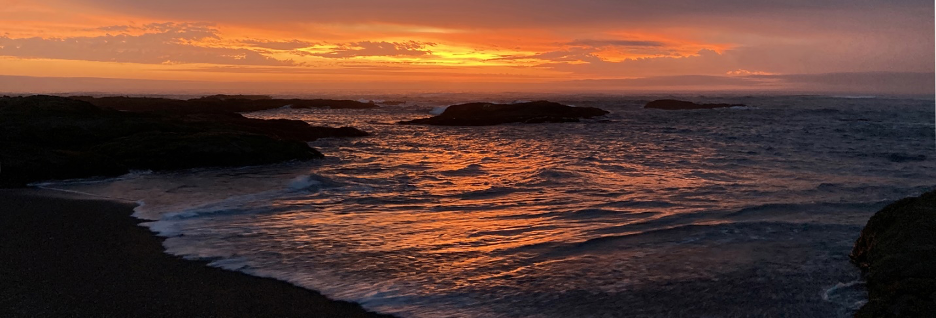
This past Saturday, February 19th, I was fortunate to attend a lecture in Caspar by the author, activist, and public intellectual Raj Patel, who has written absolutely the best book currently in print about the global food system: a New York Times best-seller called Stuffed and Starved. The lecture was part of a weekend conference sponsored by The Mendocino Institute, brainchild of labor historian and Fort Bragg resident Cal Winslow. Among the main supporters of the project are the anarchist and social historian Iain Boal and forest restoration ecologist Will Russell.
Nearly 200 people crammed into the Caspar Community Center to hear Patel’s energetic presentation on the theme of “food sovereignty” – a distinct idea, Patel clearly explained, from that of “food localization.”
“Food sovereignty” is a term coined by members of Via Campesina in 1996 to refer to a policy framework advocated by farmers, peasants, pastoralists, fisherfolk, indigenous peoples, women, rural youth and environmental organizations whereby they claim the right to define their own food, agriculture, livestock and fisheries systems, in contrast to having food largely subject to international market forces. The realization of this aim necessarily entails free access to enough land to grow the food themselves.
Here in Mendocino County, more than four decades on from the Back to the Land movement, and with the sorts of problems the localization groups seek to address – Peak Oil and climate change – becoming ever more pressing, somewhere on the order of 99 percent of food consumed by Mendocino County residents was grown somewhere else. Most prime agricultural land is used in the production of a pair of non-essential, non-food crops – ganja and high-end booze – that are grown almost entirely for export.
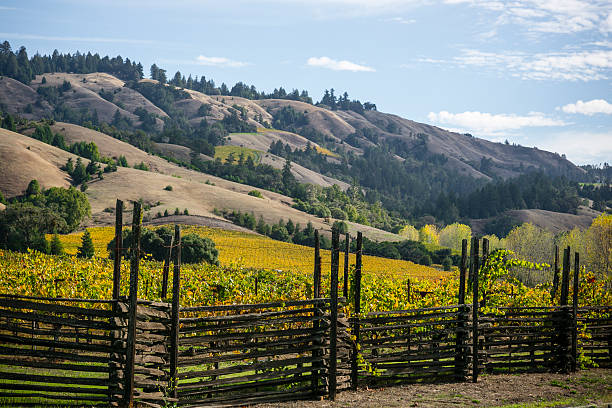
“You discredit yourself if you put forward the notion that the land is destined to remain covered by nothing more than cannabis and wine-grapes,” Patel said, in a response to an audience comment about how hopeless the application of his ideas seems in Mendocino County. He acknowledged that the idea of land occupations taking place in Northern California, such as have recently occurred in countries throughout the world to demand agrarian reform, may seem like a cruel joke now given present political conditions. However, people’s sense of what is possible tends not actually to be aligned with what actually is (as the present uprisings in the Middle East, much less in Wisconsin, make clear).
While Patel’s remarks were stridently anti-capitalist, they were compelling enough to elicit a standing ovation from many of those in attendance. I will be featuring an interview with Patel here in the pages of the Anderson Valley Advertiser in the coming weeks.
One of the further highlights of the Mendocino Institute conference was a panel entitled “Mendocino Latinos.” One of the panelists, a local Latina woman in her 30s, recalled the demonstrations for immigration reform on May 1st, 2006, which saw hundreds of thousands of demonstrators clog the streets of major American cities that day.
In Fort Bragg, an historically large march took place that spanned roughly 10 city blocks. Most participants, of course, were Latinos who were on a one-day strike from their jobs. The participants were mainly part of the Mendocino Coast tourist economy’s underclass and the migrant labor pools that tend the vines of Anderson Valley Wine Country. The day after the protest, this nascent social movement was crushed by local bosses, who fired many of the workers who participated.
It’s a safe bet that many of those who were thus discarded by the local autocrats know far more about what food sustainability looks like than your typical Mendocino County food localization activist. According to a 2004 Carnegie Endowment study, over six million farmers and members of farming families in Mexico alone entered the migration stream as a direct result of the 1994 North American Free Trade Agreement (NAFTA). A great many of them are now to be found working under grueling conditions and at peasant wages in Wine Country.
The collective lesson of Raj Patel’s presentation and the Mendocino Latinos panel is clear. As long as the dominant economic system continues to succeed in rendering the economic underclass of this region economically exploited and politically isolated, food localization will remain a distant dream. Organized labor is invariably a necessary pillar of any movement for political transformation, particularly on the scale that’s needed. The most pressing way forward is to challenge the very existence of landed gentries, such as that which persists right here in Mendocino County — a group that includes people like, to name only one obvious example, billionaire wine mogul Jess Jackson.
Will Parrish can be reached at wparrish@riseup.net.
Jackson State Forest
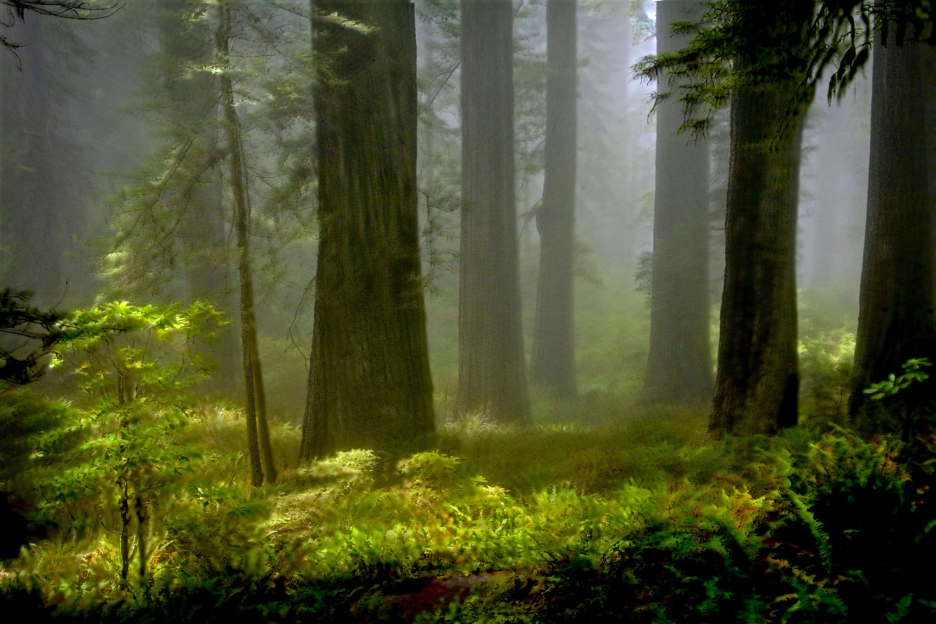
Proceedings of the Conference on the Restoration and Management of Coast Redwood Forests: Jackson Demonstration State Forest. (PDF file, requires Adobe Acrobat Reader) Papers presented at conference on restoring Jackson State Forest, November 2000, in Fort Bragg, California. Includes Ecology and Management of Coast Redwood by William Russell, Ph.D.
November 4 and 5, 2000
College of the Redwoods, Mendocino Coast Campus
Scientists, planners, educators, activists and managers working in the fields of forest and watershed restoration will meet in Fort Bragg at the College of the Redwoods, Mendocino Coast Campus, for a two-day Conference on restoration and management of public forestlands in the coast redwood region.
This Conference will examine the scientific case for the restoration of Jackson Demonstration State Forest, 50,000 acres of redwood timberland in Mendocino County owned by the State of California and administered by the California Department of Forestry.
The Conference will also explore the relationship between the forest and the surrounding communities, including considering alternative ways of determining the value of the forests to these communities and the people who live in them, as well as for the State of California.
Conference Agenda
Saturday, November 4, 2000
College of the Redwoods, Room 300
10:00 AM: Introduction.
10:30 AM: – Noon: “Restoration and Management of Coast Redwood Forests,”
12:00 Noon to 1:00 PM: Lunch.
1:30 PM to 2:30 PM: “Stream and Watershed Restoration: Process Based Woody Material Management: Soquel Creek”
2:30 PM to 3:30 PM. “Restoration: Wildlife and Fisheries.”
3:30 PM to 4:30 PM: Roundtable Discussion: “Summaries, Conclusions and Perspectives.”
6:00 PM – 7:30 PM: Buffet Dinner, Jughandle Farm
7:30 PM: Reception and Guest Speaker, Professor Iain Boal, UC Berkeley.
Sunday, November 5
8:00 AM – 10:00AM: Walking tour of Brandon Gulch THP, Jackson State Forest.
10:30 AM to 11:00 AM: “The Forest as an Educational Resource.”
11:00 AM to 12:00 Noon: “The Value of the Forest. The Economics of Restoration.”
12:00 Noon to 12:30 PM: Coffee and Snack.
12:30 PM to 2:30 PM: “The Forest and the Community.”
2:30 PM to 3:30 PM. Roundtable Discussion: “Summaries, Conclusions and Perspectives.”
Participants
Britt Bailey – Senior Associate, Center for Ethics on Toxics
Kathy Bailey – Sierra Club
Terri Jo Barber – Hydrologist
Amy Barg – Senior Research Associate, UC Berkeley
Bill Baxter – Jackson Demonstration State Forest
Craig Bell – Salmonid Restoration Federation
Greg Giusti – UC Cooperative Extension, Extension Forester, Mendocino County
Ruskin Hartley – Program Director, Save-the Redwoods League
Bill Heil – Micromiller
Pat Higgins – Pacific Watershed Associates
Robert Jamgochian – Mendocino High School, SONAR
Neil Lassettre – Graduate Research Associate, UC Berkeley
William Lemos – Mendocino High School, SONAR
Dean MacCannell – Professor, Environmental Studies, UC Davis
Tim Metz – Institute for Sustainable Forestry
Pete Morton – Wilderness Society
Tim Metz – Institute for Sustainable Forestry*
Richard Owings – Executive Director, Mendocino Coast Botanical Gardens
Renee Pasquanale – Ecologist, State Parks
Linda Perkins – Redwood Chapter Sierra Club
Monroe Robinson – Micromiller
Will Russell – Postdoctoral Research Associate, Forest Science Division, UC Berkeley
Teresa Sholars – Professor of Biology, College of Redwoods
Tess Albin Smith – Jackson Demonstration State Forest
Roger Sternberg – Director, Mendocino Land Trust
James Strittholt – Director, Conservation Biology Institute
Vince Taylor – Director Dharma Cloud Foundation
Cal Winslow – Director, Mendocino Institute
Seth Zuckerman – Ecotrust
For more information, Please call 707-964-4499 or email cwinslow@mcn.org
For More information, please contact:
Cal Winslow, Ph.D.
Director, Mendocino Institute: Box 1789, Fort Bragg, CA 95437
707-961-9603
The Mendocino Institute is a non-profit, community based research and educational center located on the North Coast of Mendocino County. Its purpose is to develop and promote polices that will enhance the environment, the communities and the way of life of the people of Mendocino County.
